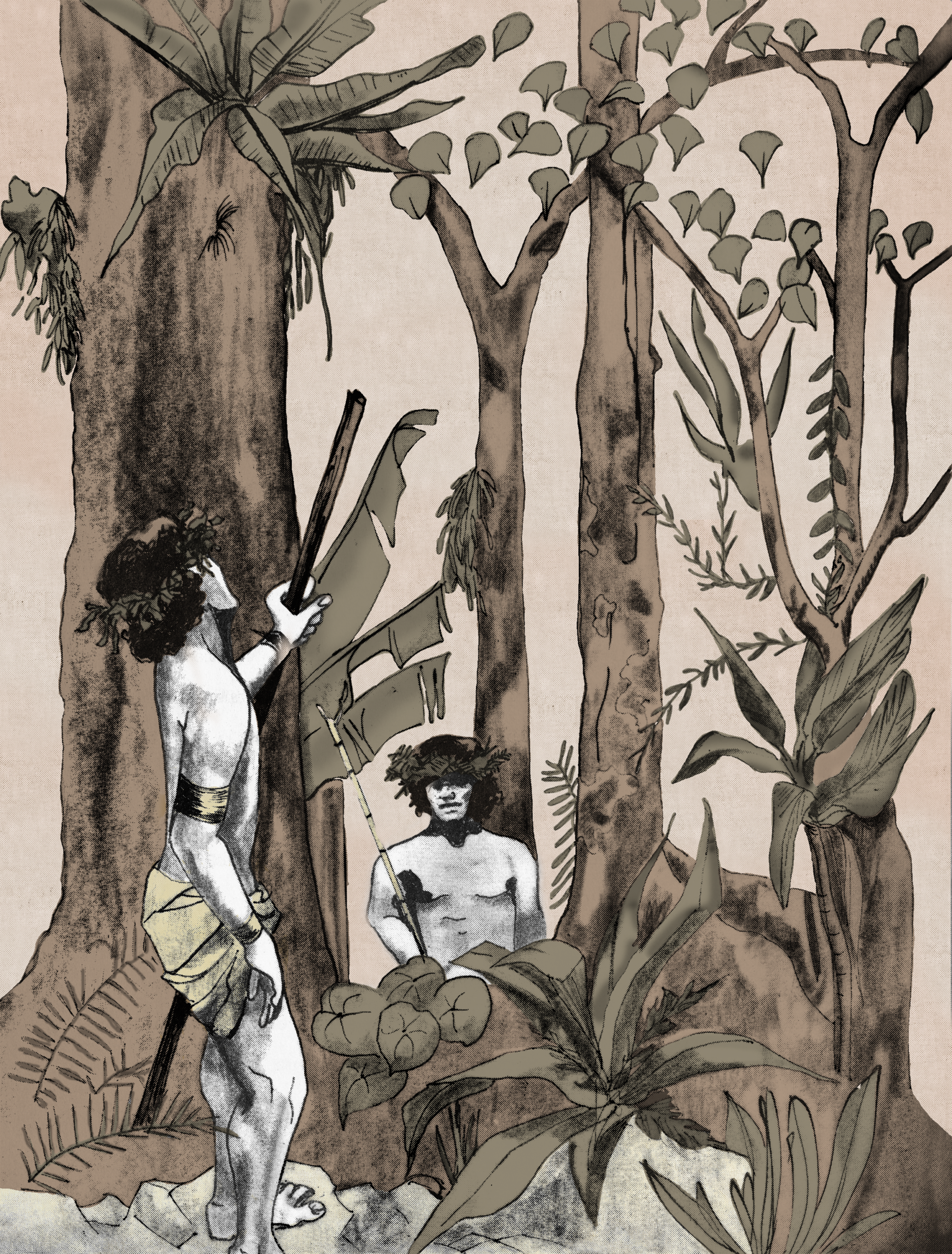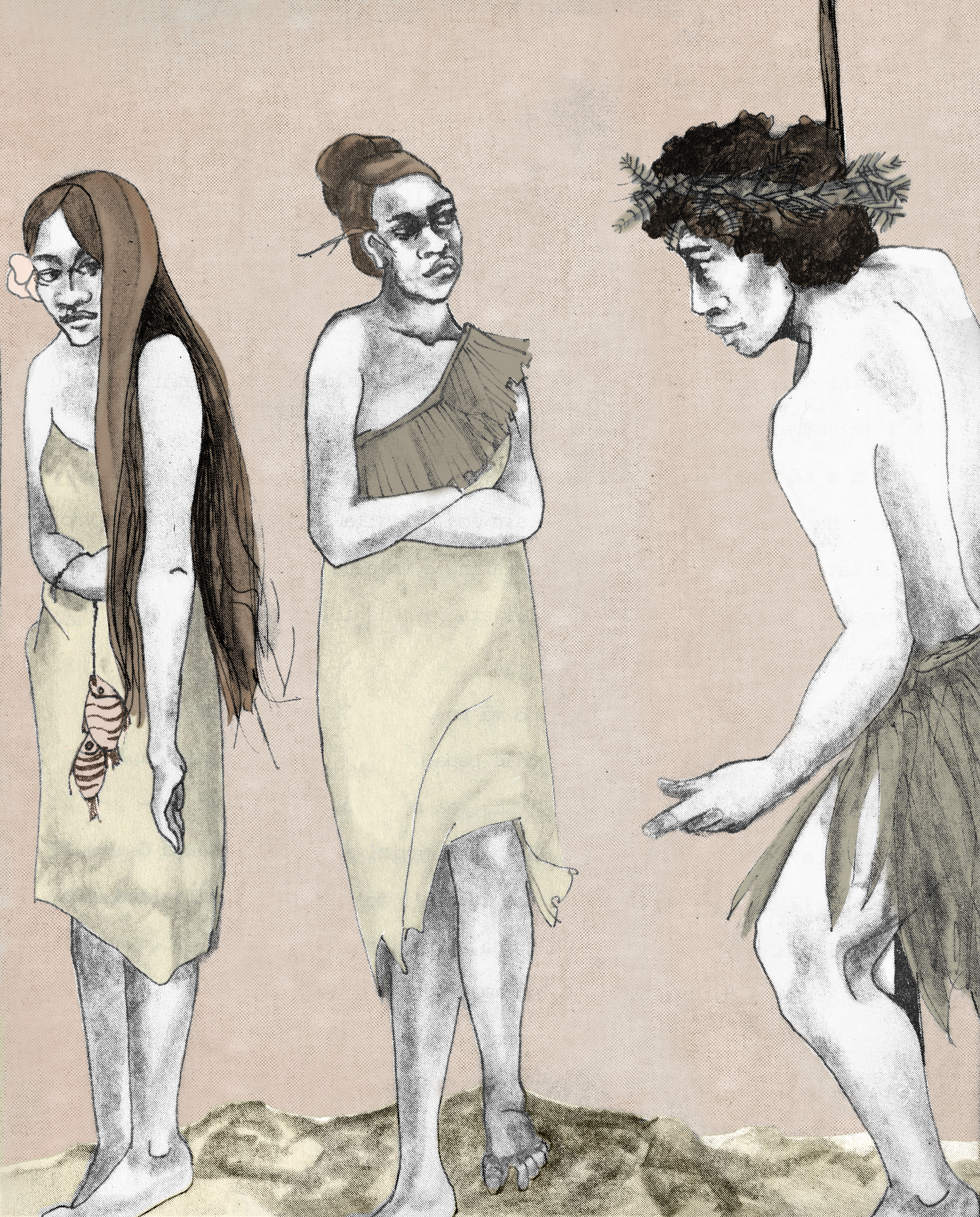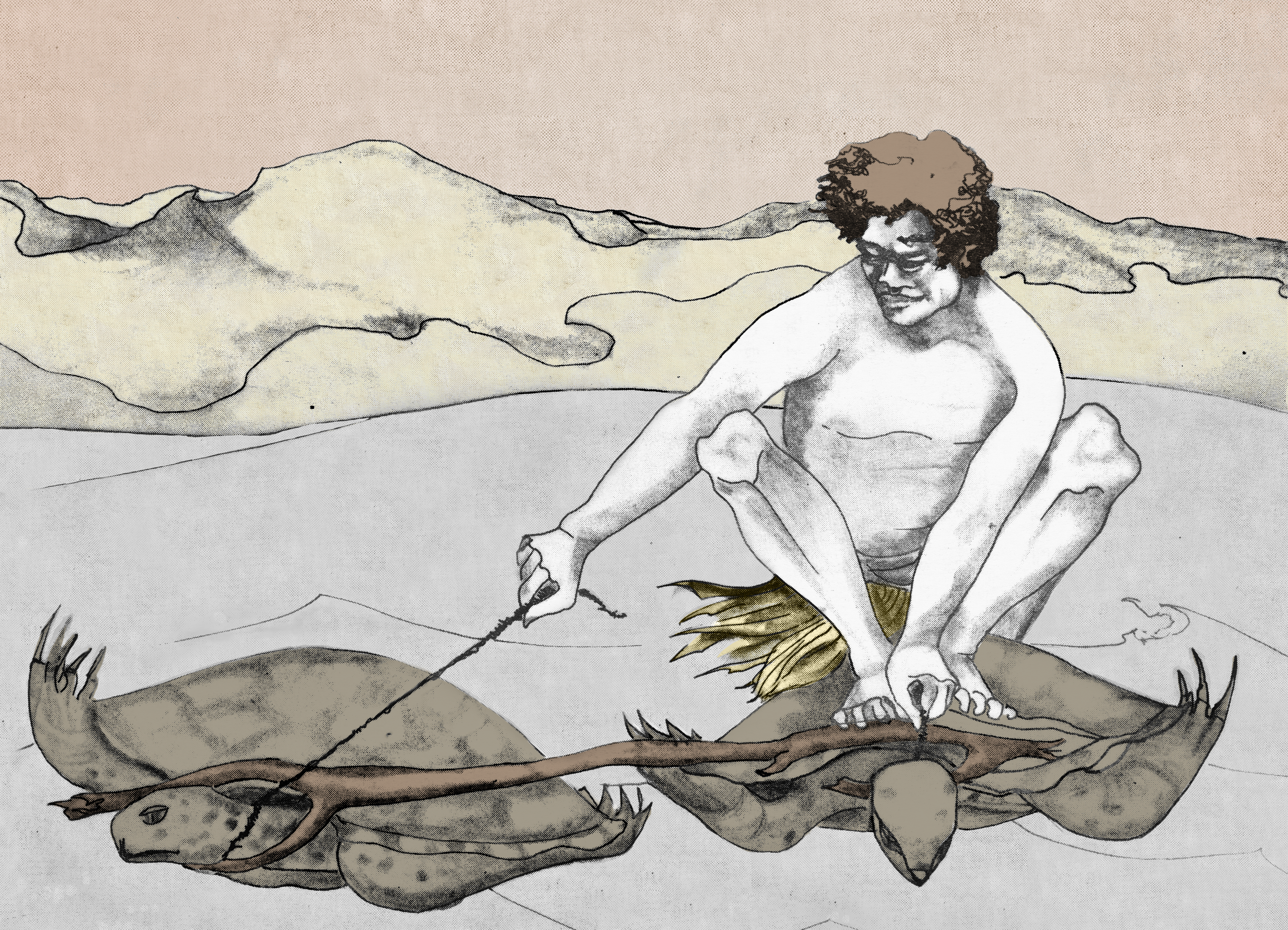
In the village of Taga in Savaii, there was a maiden named Lau. She was sought by many young men from Samoa who competed for her affections. The young man who won her heart was a young man named Olo from Falelatai in Upolu. Soon enough Lau married Olo. However, there was a young man from the village of Amoa,whose name was Tigi, who lusted after Lau and wanted her to be his wife. Even though Lau had already married Olo, Tigi insisted to himself that there must be a way to make Lau his wife.
One day, after Lau and Olo had made their home in Taga, in Savaii, Tigi visited them. When he arrived at their home, Lau was there alone and Olo had gone out. When Lau saw Tigi, she invited him in asking, “Where are you heading?”
Tigi replied, “I was searching in the forest for a wooden steering board for my boat.” Then he asked Lau, “Where is your husband Olo?”
Lau answered him, saying “Olo is out bonito fishing.”
Tigi was very happy with this news and, with no shame at all, immediately confessed to Lau, “I am not really searching for a wooden steering board, but I am searching for a wife.” After he said that, he pressed on with his amorous words, fervently declaring his desire to be married to Lau. Lau did not wait long to agree, and promptly succumbed to his advances then and there without any hesitation. When Olo returned from fishing, he found Tigi at his home. He then asked Tigi where he came from.
Tigi answered vaguely, “My journey began somewhere in Fa’asalele’aga.” Olo then asked again, “And where is your journey headed to?” Tigi answered, “I am here looking for a wooden steering board for my boat.”
Olo then answered, not knowing Tigi was not looking for a wooden part for his canoe at all, but instead intended to steal his wife. “Good. There are many fine trees in the forest to make a part for your boat. But it is better if we go early tomorrow morning to the forest to seek just the right tree.”
It was done as planned in the dawn of a new morning on the very next day. Olo and Tigi went out to search for the perfect tree for a part for Tigi’s boat. But Tigi directed Olo onto the wrong path, so that Olo would continue alone, while Tigi turned back to be together with Lau to resume their amorous adventure. Towards the evening, Olo returned home and Tigi said, “Come, please understand that I am new to the forest and that is why I returned to your home early.” Olo did not reply, since he had begun to suspect that something was amiss between Tigi and his wife Lau.
Eventually, Tigi grew tired of this domestic arrangement of the three of them, and returned to his family in Amoa, despite that Lau was pregnant from him. Lau gave birth to a baby boy. She raised and cared for him until he was a young man. One day, Olo and her son went fishing. When they reached the beach, Olo directed him, saying “Listen now and look! When I cast the net, jump in quickly to help gather the fish.” Olo then threw the net into the sea. But just at the moment when he tossed it, the son became distracted by the sight of two small fish (manini) swimming in the break of the waters, and did not follow instructions, but instead focused on capturing the two smaller fish. He took the small fish and placed them in a coconut shell with seawater. Olo became very upset that he was disobedient and did not help. He said “Why did you not jump in as I cast the net? Pretty soon I’m going to kill you! It’s not as if you are my son!” The son cried as he heard these words from Olo. He then went to his mother and cried. Lau said to her son, “Why are you crying?”
The boy complained tearfully, “Olo said, pretty soon he was going to kill me, as if I were not his son.”
Lau then said, “It’s true. You are not. Actually, your father is a chief of Amoa named Tigi.” Lau continued, “Come let us go and reveal yourself to your real father Tigi.” And they did just that. They gathered all their things and went to Amoa to meet Chief Tigi.
Olo returned home after fishing. When he arrived, the house was empty, as Lau and her son had packed all their belongings and had left. Olo quickly reasoned that Lau had left with her son to go to Tigi. Olo followed them to Amoa, intending to confront his wife Lau. When he arrived in Amoa, Lau was living in Tigi’s home, and, as Olo immediately observed, would not leave. So they began living together in Tigi’s house. Soon after Olo had settled in, while conversing, Lau asked Tigi, “What name should we call our son?” Tigi answered, “It is best to call him Tigi and Lau—Tigilau.” But Olo interrupted and said “Please, Tigi, can you also add my name to his name?” And it was done as they all agreed. And the boy was named, Tigilaumaolo. However, he became known by his shorter name: Tigilau.
When Tigilau was living with his parents in Amoa, he remembered his two small fish he had left behind back in Taga Village. He then traveled to get them, and placed them in the waters above a rock near the oceanside of Amoa. Those fish were like gods to Tigilau, and to them he offered many sacrifices.
Then one day, Tigilau went to play in the woods. He met two women by the wayside who had just come from the land called Tapu’ele’ele. He then asked, Where are you two going?”

Then the women replied, “We’re going to gather seawater.” They continued on their way, and, while passing through the rocks, they saw the two small fish belonging to Tigilau in the water. But instead of gathering seawater, they captured and killed the fish and took them inland. They again met up with Tigilau along the road where a suspicious Tigilau asked, “Where did you get those fish?” The women answered, “These are our fish we found by the rocks.”
Tigilau looked again. He confirmed that those were his fish that the women had stolen and killed. Infuriated, he hit the first lady so hard with a wooden stick that she died immediately. He did the same to the other woman. Then Tigialu said, “It is as if they were your fish.” After he killed the women, he divided the dead fish in half. He then took the pieces and oiled them and made them yellow at the core, then he put them in a tiny basket and hung it in his house. While these fish hung in his home, Tigilau’s father’s sister found the basket, searched through it, and ate all of Tigilau’s fish. When Tigilau returned, finding there were no fish, he asked his mother, “Where are my pieces of fish?”
His mother answered, “Your father’s sister who is pregnant ate them.”
Tigilau became very angry and then said, “She will be cursed for eating my fish!” Again infuriated, he then threatened his heedless, thoughtless aunt with a curse. “You will give birth to no child, but instead, to two different fish to replace my fish”.
As it turned out, the curse came to pass just as Tigilau predicted. When she gave birth, instead of a child, she gave birth to two turtles. These turtles were named by Tigilau as Utuutu and Toga. He then took his turtles and placed them in the water on the rocks where his fish had originally lived.

It became widely known throughout the lands that those two turtles, Utuutu and Toga, were the gods to whom the people of Amoa offered their highest and most important sacrifices.
Word spread about Tigilau’s growing wealth which resulted from the two turtles’ many sacrificial offerings. The story of his wealth also reached Tonga.
When this was heard by the talking chief of the king of Tonga who was named ‘Ae, he eagerly traveled to Samoa to see Tigilau’s turtles for himself. Seeking to gain favor with Tuitoga, he also searched for a way to kill Tigilau’s turtles, but he could not immediately think of a way to do that without becoming discovered. So, when it came time for ‘Ae to return to Tonga, he said to Tigilau, “Please, can I be escorted by Utuutu and Toga to Tonga?”
Tigilau answered, “Yes, but only under one condition, please take great care of my turtles. As you know, these are the godly creatures to whom our village offers many sacrifices.”
So the two turtles Utuutu and Toga accompanied ‘Ae to Tonga. When they arrived, then Toga said to Utuutu, “Wait here, I will take ‘Ae to the shores.” It was done as said, and Utuutu waited as Toga escorted ‘Ae to the shores. When they reached the shore, ‘Ae jumped down and held on to the turtle while he called to the villagers of Tonga to come and kill the turtle. The Tongan people came and killed Tigilau’s turtle Toga. When the turtle Utuutu saw what happened to Toga, he swam away as fast as he could to Samoa. As Tigilau scanned the horizon, he saw that Utuutu was swimming home alone without Toga, and presumed the worst. Toga was killed in Tonga. Tigilau cried out, for he loved his turtles more than anything on earth.
In his fury, he begged for retribution. He asked all the evil spirits of Amoa to seek out his enemy. But, after the spirits were done communing with one another, his wishes were not accepted by the spirits of Amoa. He then cried out to the neighboring spirits of Safotulafai and Sapapalii but they, too, did not agree to carry out his vengeful wishes. Finally, in desperation, he then went to Salelologa and cried to the most powerful evil spirit there named Supa. Supa gathered together all of the spirits of Salelologa village and brought ‘Ae from Tonga and took him to Tigilau, whereupon ‘Ae was killed by Tigilau.
This story brings about the Samoan proverb, “O Tigilauma’olo se’i ta’u mai, sa moe i malae i si ona fili pe maua ai.” (Meaning: Tigilauma’olo, please say, had slept in the field, see if you can find your enemy there.)
Note: In “Tigilau: The manaia of legends,” the story of Lau of Taga, Savaii, Olo from Falaletai, Upolu and the amorous scheming of Tigi from Amoa, and the result of their arrangement in the birth of the child, the magnificent Tigilau, is no more beautifully told than by HTC Fofo Sunia, in Samoan Legends of Love and Courtship, (2016), pp. 40-45, where Tigilau grows up to be renown and the most talented, prosperous and popular manaia of all legend, and, like his father Olo, to whom he returns at Falelatai, a legendary fisherman of generosity and enviable wealth.
Comments are closed here.